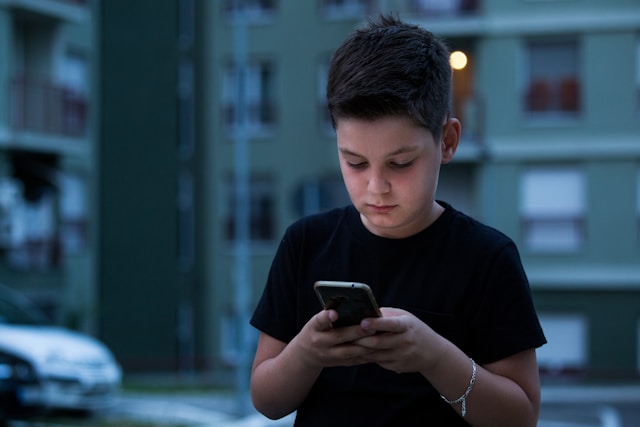It’s not easy keeping up with what’s going on in your teen’s world, especially when it’s happening online.

One thing that’s quietly becoming more common? Exposure to the incel movement. Short for “involuntary celibate,” it’s a mindset that often grows in online spaces where frustration, isolation, and resentment, especially toward women, get magnified. It’s not always obvious at first, but it can take hold fast. Here are some important things parents should know, without panic—just real awareness.
1. It often starts with loneliness, not hate.

Many teens who stumble into these communities aren’t full of anger at first. They’re just lonely, insecure, or trying to figure out where they belong. They start watching videos or reading posts that seem relatable or funny at first, but slowly, the messaging gets darker. This is why early signs are easy to miss. It doesn’t always start with rage; it starts with feeling like you’re on the outside of everything, and someone finally “gets it.” The dangerous stuff often comes later.
2. The online content looks harmless until it’s not.

Some of the memes and jokes shared in these spaces seem silly on the surface—sarcastic posts, exaggerated complaints, even cartoon avatars. But underneath, there’s often a strong thread of bitterness and blame that starts seeping into how they view the world. It’s not always easy to spot the shift. What starts as edgy humour or venting can turn into entitlement, resentment, and an “us vs. them” mindset, especially toward women, or people they see as more socially successful.
3. It thrives in isolation.

Teens who already feel like they don’t fit in socially, romantically, or even just physically are often more vulnerable to this kind of thinking. These spaces offer an identity, a group, even if it’s a toxic one. That sense of belonging is powerful, and the more isolated they feel offline, the more they may retreat into these digital echo chambers where everyone feels the same, and negativity gets reinforced instead of challenged.
4. It often uses coded language.

Words like “Chad,” “Stacy,” “red pill,” or “black pill” might not mean anything to you, but they carry serious weight in these communities. They’re part of an insider vocabulary that reinforces who’s in and who’s out—who’s “winning” at life and who’s been left behind.
Learning the language can help you spot signs earlier, or understand what your teen is talking about if they’re joking about these things. Not all use is a red flag, but it’s worth paying attention to how often these terms come up and in what context.
5. Many teens don’t realise how toxic it’s become.

For a lot of young people, especially boys, being online means absorbing constant messages about dating, masculinity, and status. It’s easy for these ideas to blend into regular content without them even noticing.
They might not realise the impact it’s having, or how extreme some of the beliefs actually are. They’re not necessarily joining a “movement.” They’re just soaking in content that slowly shifts how they think and talk about relationships, often without questioning it.
6. It can lead to emotional shutdown in real life.

Teens caught in these spaces often start believing that nothing will ever change for them, that they’re doomed to be rejected, left out, or looked down on forever. It creates this deep hopelessness, paired with anger at everyone they think is “winning.”
That mindset doesn’t just stay online. It can show up as withdrawing from friends, avoiding conversations about dating or emotions, or being cynical about people in general. It’s not just sadness. It’s resignation and disconnection.
7. It sometimes masks deeper mental health issues.

What looks like anger or nihilism might actually be depression, anxiety, or social anxiety that hasn’t been named yet. Teens who feel stuck often turn to these communities because they feel seen, even if what they’re hearing isn’t healthy. When teens don’t feel safe to talk about their struggles in real life, they look for answers online. And sometimes, those spaces fill the silence with harmful narratives instead of real support.
8. Teens often double down when they feel judged.

If you come in hot, shaming, accusing, or mocking them for what they’re watching or saying, they’ll usually shut down. That defensive reaction is normal, especially if they already feel misunderstood or alone. Instead, try curiosity over confrontation. Ask what they like about the content or how they relate to it. You don’t have to agree—you just have to show that you’re listening. That opens the door to real conversation later on.
9. It’s okay to set limits, but they work best with context.

Boundaries around screen time, social media, or certain platforms can help, but they’re not a fix by themselves. If a teen feels like the only people who “get” them are being taken away, they’ll just find new corners of the internet to land in.
It helps to explain the why behind the boundary. Talk about how algorithms feed negativity or how echo chambers work. When teens understand that they’re being pulled into something designed to keep them stuck, it becomes easier to walk away.
10. Real-life connection makes a big difference.

It’s easy to roll your eyes at “get outside” advice, but honestly, connection in the real world is one of the most powerful ways to shift this pattern. The more teens feel seen, valued, and supported offline, the less appealing those toxic spaces become.
Encourage hobbies, friendships, work, volunteering—anything that gives them a sense of agency and belonging. It’s not about keeping them busy; it’s about reminding them that the world is bigger than what they’ve been fed online.
11. Girls and LGBTQ+ teens can be affected too.

While the incel movement is mostly tied to young men, the surrounding content, especially the stuff that blames women or shames people for how they look or date, can impact everyone. No one’s fully safe from the pressure to conform or the fear of not being “good enough.” Some teens, regardless of gender, absorb the self-blame or internalise the idea that relationships are transactional or hopeless. It’s worth checking in with all your kids, not just the ones you think are vulnerable.
12. It doesn’t mean your teen is dangerous or broken.

Hearing your teen repeat something they saw in an incel forum or echoing harsh views online can be scary, but it doesn’t automatically mean they’ve turned toxic. It might just mean they’re repeating what they’ve seen and haven’t been offered a better way to think about it yet. This is where calm conversations matter. Keep showing up with curiosity and care, not just correction. Your voice still carries weight, even when it doesn’t feel like it.
13. The goal isn’t to lecture—it’s to stay connected.

You don’t have to know every term, platform, or reference. You just have to stay close. Let your teen know you’re a safe space to talk, even about messy or uncomfortable stuff. That alone can change everything. When they trust you enough to bring their confusion, their insecurities, and even the things they’re not proud of, that’s when the real impact happens. Because the opposite of falling into toxic ideology isn’t just information. It’s connection.




